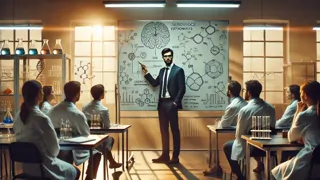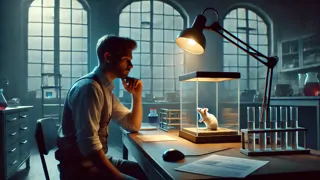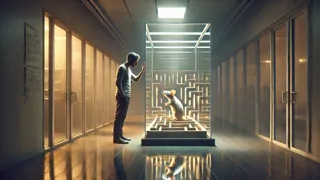Introduction
Charlie Gordon sat alone in the small interview room at the Beekman Research Center, the pale radiation of white walls reflecting the curious, tightly coiled thoughts in his mind. From the moment he was led through the corridor, he felt the hush of anticipation that settled around the scientists and assistants like a gentle fog. They spoke to him in calm, measured tones—"Charlie, you’re here to help us, and we’re here to help you." In his previous encounters with tests and trials, Charlie had sat at desks under bright bulbs and scribbled letters and numbers until his hand ached. He remembered the shapes on the paper, the guilt when he felt he couldn’t keep pace, the ache of final bell ringing at school. Now, however, there was a different promise in the air—one of transformation, of an experiment designed not to punish but to elevate his mind, to grant him the cognitive clarity he had always yearned for in dreams flickering at the edges of sleep. Though he carried the soft weight of uncertainty, he allowed curiosity to guide him. He thought of Algernon, the little white mouse whose brilliance had startled the researchers—how he navigated mazes with uncanny grace, how he paused on the precipice of triumph before running the final corridor with an almost joyous pride. Charlie pictured the mouse’s bright, pink nose twitching at the maze’s entrance, and in his chest a cautious hope stirred. Could the same procedure that gave Algernon gift of swift reasoning grant him the ability to read, to write, to hold nuanced conversations around the dinner table at home? He clung to the scientist’s words—"It’s safe, Charlie. We’ll watch you closely." With hands folded into his lap, he nodded, a determination ignited within him. Deep inside, a quiet voice whispered that this might be the day when everything changed.
The Experiment and Early Triumphs
Charlie Gordon’s first weeks under observation unfolded like a slow, surreal dream. Paragraph One:

From the moment the scientists administered the initial dose, Charlie experienced nothing more dramatic than a faint warmth spreading through his veins, as though the cells in his brain were waking from a long, restful nap. He returned home that evening to his modest apartment above the bakery where he worked. As he climbed the stairs, he sensed the world differently—the hum of the streetlamp outside, the scent of sugar and yeast drifting through a cracked window, even the soft creak of each stair under his foot seemed to bear significance. He found himself mentally retracing every letter he’d learned as a boy, and he paused at the threshold of his door, as if seeing it anew. Over the next days, his writing tests began to improve. Words that once evaded him now arranged themselves in neat, practiced lines on paper. He filled page after page with cursive loops, composing sentences with startling coherence: "I am grateful for the chance to learn and grow. I wish to understand the world more fully." The researchers’ eyes gleamed with triumph when they read his journals, but Charlie cared most about the letters his teacher, Miss Kinnian, wrote back. She praised his devotion and encouraged him to explore books beyond the primer he treasured. She sent him volumes of poetry, short stories, and essays. The moment he cracked open his first thick hardcover, he felt an electric thrill. Each syllable seemed to shimmer off the page as he read lines from Emily Dickinson and Walt Whitman on a Saturday afternoon sunbeam.
INSERT IMAGE BETWEEN PARAGRAPHS 1 AND 2
His days filled with learning, Charlie’s sense of self blossomed. He began to anticipate the next assignment at the laboratory, sketching out mental flowcharts of chemical reactions and neural pathways—terms like "synapse," "cognitive plasticity," and "neurogenesis" becoming part of his everyday vocabulary. He debated hypotheses in the cafeteria with the graduate students, challenging them on criteria that once would have confounded him. He felt pride rush through his chest, a new sensation both exhilarating and, at times, isolating, for he was no longer the man he used to be. In quiet moments he wondered if he was losing the simplicity that once anchored him, but he pressed forward, driven by an insatiable hunger for knowledge.
Paragraph Three:
By the end of the first month, the scientists conducted complex problem-solving tests in glass-walled labs. Charlie moved through multivariable algebra and logic puzzles with an ease that astonished even Dr. Strauss and Professor Nemur. They congratulated him, sometimes placing a reassuring hand on his shoulder, as if to remind him they still believed in his humanity beyond the results. Yet Charlie noticed the way the researchers scribbled their observations in thick notebooks, measuring not only his IQ but the depth of his emotional responses, his capacity for empathy, and his resilience under pressure. He felt alive in every nerve and synapse, a mind unleashed and racing toward horizons he had never dared to imagine.
Rising Intellect and Emotional Awakening
Paragraph One:

As Charlie’s intelligence continued to soar, his world unfolded in shapes and shades he’d never known. Words were not the only new treasures; music, art, and history now resonated with hidden complexity. He took up the piano, letting callused fingers dance across keys to coax melodies from Mozart and Chopin. He spent late nights poring over philosophical treatises by Camus and Sartre, marveling at sentences that twisted language into tools for probing human nature. Yet, for all his cerebral triumphs, Charlie found himself confronting memories and feelings that had long sat buried beneath the simplicity of his earlier life. He began to recall faces from childhood—loved ones and bullies alike—with vivid clarity, and he felt an ache for the moments he had not recognized as precious until they vanished.
Paragraph Two:
Miss Kinnian arrived one afternoon bearing a stack of art prints. She showed him paintings by Van Gogh and Frida Kahlo, each stroke speaking volumes of internal struggle and fierce beauty. Charlie looked into the swirling yellows of "Starry Night" and saw not just a sky, but the pulse of longing and the hush of midnight wonder. In Kahlo’s self-portraits he sensed courage born of pain. Tears pricked at his eyes. He realized that intelligence was not solely about solving equations or reciting encyclopedic facts; it was about the capacity to feel, to empathize, to carry joy and sorrow in equal measure.
INSERT IMAGE BETWEEN PARAGRAPHS 1 AND 2
Paragraph Three:
These emotional awakenings brought both joy and turmoil. Charlie visited his old neighborhood—quiet rowhouses and familiar sidewalks—only to feel dislocated, as if returning to a hometown that now belonged to someone else. He tried to speak with friends from the bakery, but their conversations spun too slowly for him now, and he recognized in their faces a mixture of pride and confusion, love and fear. In the lab, the researchers monitored his mood carefully, asking him to complete questionnaires about his sense of self and relationships. In his journal, Charlie wrote at length: "Sometimes my heart feels heavy, as though I carry everyone’s unspoken longing inside me. Perhaps that is the true gift of knowledge—to feel everything more deeply." His pen hovered over the page when he considered Algernon, the mouse whose brilliance had begun to fade in recent days. He resolved to study the data, to understand whether the same regression might threaten him too.
Paragraph Four:
In long nights at the microscope, Charlie scrutinized Algernon’s condition. The little white mouse moved more slowly now, his once rapid maze-running stunted by confusion. Charlie documented every detail in painstaking reports, but he could not bring himself to share his growing dread with the scientists. He worried they might halt the study or see him as a failed experiment rather than a human being. When Algernon refused to eat, Charlie knelt beside the cage and whispered promises. He longed to rush home to his old friends, to rediscover the warmth of simple laughter unclouded by the ache of comprehension. Yet the labyrinth of his mind offered no refuge, only corridors of memory and emotion, entangled like threads in a tapestry that might soon unravel.
Confronting the Inevitable Regression
Paragraph One:

Charlie noticed the first signs of change in a stack of broken test answers. Equations once solved neatly now became smudged and incorrect. Terms he had mastered—"neural plasticity," "cognitive mapping," "hippocampal function"—slipped from his mind, leaving hollow spaces he could not fill. His journal entries grew shorter, the language less precise, fewer paragraphs echoing the depth they once carried. At night, he lay awake, listening to the hum of machines in the silent corridors, fearing the same loss that had overtaken Algernon. He studied the little mouse’s open field tests, wondering whether the animal knew as profoundly as he did the sorrow of intelligence relinquished.
Paragraph Two:
His world shrank as memories blurred. Late one afternoon, Charlie returned to the research center to find Miss Kinnian waiting in the hallway. Her eyes, once bright with encouragement, now clouded with painful recognition. She guided him into a small office, closing the door behind them. Charlie tried to speak, but the words tangled on his tongue as if he’d never learned them. Panic rose in his chest, hot and frantic. He grabbed her hand, holding it tight, seeking reassurance in the warmth of her palm. Tears welled in his eyes, and for a fleeting moment, his mind grasped the truth: he was slipping away, descending a staircase whose bottom he could not see.
INSERT IMAGE BETWEEN PARAGRAPHS 1 AND 2
Paragraph Three:
In the days that followed, Charlie’s speech became hesitant and fragmented. The lab researchers recorded his performance metrics with clinical detachment, yet Charlie sensed their collective heartbreak. Watching him erase words he had once scrawled, they realized the experiment’s tragic symmetry: Algernon’s fate had become Charlie’s. The protective shell of his newfound intellect crumbled, revealing the simple soul that awaited him at the bottom—a soul still warm with empathy but wounded by loss. In his final report, Charlie wrote with trembling script: "I remember being smart. I remember feeling so many things. But I love you all, and I hope you remember me kindly when the words leave me." He folded the paper with care, tears smearing the ink, a testament to the man he had been and the man he would again become.
Paragraph Four:
On his last evening at the center, Charlie wandered through the halls illuminated by soft incandescent bulbs. He paused before the glass maze that once defined Algernon’s brilliance, tracing the pattern with his fingertips as if to recall each twist and turn. In the silence, he felt a profound peace settle over him. He would return to his simple life, to the bakery above which he had once dreamed of books and ideas, and he would cherish the moments he could still understand. He looked up, resolved to carry forward the compassion he had learned even as the mind that had lit his world faded back into gentler simplicity. And somewhere, in the quiet of that labyrinth of research and memory, the little mouse’s bright spirit whispered once more.
Conclusion
In the days and months after the procedure, Charlie Gordon returned to the rhythms of his life before the experiment. Though the extraordinary brightness of his intellect waned, its echoes remained in the gentle kindness he showed to every person he met. He tended the bakery oven with nimble hands, greeting early-morning customers with warm smiles and steady patience. When children skidded across the floor or adults lingered over coffee and bread, Charlie offered a listening ear, recalling the depth of thought and empathy he once held. He wrote short notes on thank-you cards, the script simple but sincere, each word carrying the weight of memory and gratitude. At night, he sometimes dreamed of books he could no longer read, of complex ideas floating just beyond his grasp. Yet he woke each morning with a heart full of compassion, aware that the true miracle he carried was not intelligence but the capacity to love deeply and to recognize the quiet brilliance in others. In those moments, Charlie understood that every mind is a treasure, however it may shine, and that perseverance and kindness can illuminate the darkest corridors of the spirit.


















